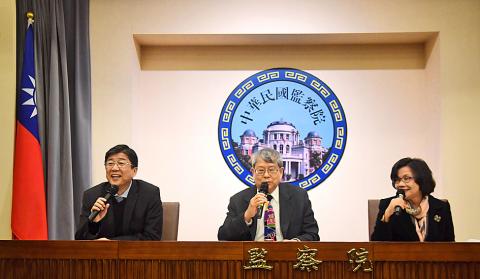The Control Yuan yesterday voted seven to four to impeach National Taiwan University (NTU) president Kuan Chung-ming (管中閔) for allegedly breaching the Civil Servant Work Act (公務員服務法) by writing opinion pieces for the Chinese-language Next Magazine (壹週刊) while serving as minister without portfolio.
Control Yuan members Chen Shih-meng (陳師孟), Tien Chiu-chin (田秋堇), Fang Wan-fu (方萬富), Lin Sheng-fong (林盛豐), Walis Perin, Peter Chang (張武修) and Yang Fang-wan (楊芳婉) voted for the impeachment, while members Wang Mei-yu (王美玉), Liu Te-hsun (劉德勳), Chang Jen-hsiang (章仁香) and Chiang Ming-tsang (江明蒼) voted against it.
An investigation into Kuan’s allegedly illegal work was launched by Control Yuan members Wang Yu-ling (王幼玲) and Tsai Chung-yi (蔡崇義) in April last year.

Photo: CNA
The case is to be forwarded to the Public Functionary Disciplinary Sanction Commission.
According to a statement that Next Magazine submitted to the Control Yuan, while Kuan was a professor at NTU, he made a verbal agreement with the magazine that he would write opinion pieces in return for NT$50,000 (US$1,622) per month or NT$650,000 per year, Wang Yu-ling said yesterday at a news conference in Taipei, adding that the payments totaled NT$650,000 per year, because Kuan received an additional NT$25,000 every six months.
However, Kuan’s relationship with Next Magazine continued from 2010 to 2016, which was after his invitation to join the Cabinet as minister without portfolio, she said.
Kuan continued to regularly submit opinion pieces to the magazine anonymously while serving in the Cabinet from February 2012 to February 2015, during which time he was paid NT$1.9 million, she said.
By doing so, he breached Article 14 of the act, which prohibits civil servants from taking on outside work, she said.
Civil servants are allowed to submit articles to publications, but they can only do so occasionally, Tsai said.
Kuan said in a document submitted to the Control Yuan that he only wrote for Next Magazine at the magazine’s invitation and that he had never held any position at the magazine.
The Ministry of Civil Service in 2010 ruled that providing the media with information related to a position was only legal for a civil servant when the work was unpaid, Wang Yu-ling said.
Asked to comment yesterday, Kuan said that he would explain his position after reading the Control Yuan’s decision, adding that he had not yet been officially notified.
He said he would consult with his lawyers and confirm if they had submitted his statement to the Control Yuan.
Meanwhile, Minister of Education Pan Wen-chung (潘文忠) said the ministry respects the Control Yuan’s decision.
“The case is in a preliminary stage and the ministry will not act on it until the decision passes a second review at the Public Functionary Disciplinary Sanction Commission,” he said.
Additional reporting by Ann Maxon, staff reporter

INVESTIGATION: The case is the latest instance of a DPP figure being implicated in an espionage network accused of allegedly leaking information to Chinese intelligence Democratic Progressive Party (DPP) member Ho Jen-chieh (何仁傑) was detained and held incommunicado yesterday on suspicion of spying for China during his tenure as assistant to then-minister of foreign affairs Joseph Wu (吳釗燮). The Taipei District Prosecutors’ Office said Ho was implicated during its investigation into alleged spying activities by former Presidential Office consultant Wu Shang-yu (吳尚雨). Prosecutors said there is reason to believe Ho breached the National Security Act (國家安全法) by leaking classified Ministry of Foreign Affairs information to Chinese intelligence. Following interrogation, prosecutors petitioned the Taipei District Court to detain Ho, citing concerns over potential collusion or tampering of evidence. The

NEGOTIATIONS: Taiwan has good relations with Washington and the outlook for the negotiations looks promising, Minister of Economic Affairs J.W. Kuo said Taiwan’s GDP growth this year is expected to decrease by 0.43 to 1.61 percentage points due to the effects of US tariffs, National Development Council (NDC) Minister Paul Liu (劉鏡清) said at a meeting of the legislature’s Economics Committee in Taipei yesterday, citing a preliminary estimate by a private research institution. Taiwan’s economy would be significantly affected by the 32 percent “reciprocal” tariffs slapped by the US, which took effect yesterday, Liu said, adding that GDP growth could fall below 3 percent and potentially even dip below 2 percent to 1.53 percent this year. The council has commissioned another institution

TRADE: The premier pledged safeguards on ‘Made in Taiwan’ labeling, anti-dumping measures and stricter export controls to strengthen its position in trade talks Products labeled “made in Taiwan” must be genuinely made in Taiwan, Premier Cho Jung-tai (卓榮泰) said yesterday, vowing to enforce strict safeguards against “origin laundering” and initiate anti-dumping investigations to prevent China dumping its products in Taiwan. Cho made the remarks in a discussion session with representatives from industries in Kaohsiung. In response to the US government’s recent announcement of “reciprocal” tariffs on its trading partners, President William Lai (賴清德) and Cho last week began a series of consultations with industry leaders nationwide to gather feedback and address concerns. Taiwanese and US officials held a videoconference on Friday evening to discuss the

NEGOTIATIONS: The US response to the countermeasures and plans Taiwan presented has been positive, including boosting procurement and investment, the president said Taiwan is included in the first group for trade negotiations with the US, President William Lai (賴清德) said yesterday, as he seeks to shield Taiwanese exporters from a 32 percent tariff. In Washington, US Trade Representative Jamieson Greer said in an interview on Fox News on Thursday that he would speak to his Taiwanese and Israeli counterparts yesterday about tariffs after holding a long discussion with the Vietnamese earlier. US President Donald Trump on Wednesday postponed punishing levies on multiple trade partners, including Taiwan, for three months after trillions of US dollars were wiped off global markets. He has maintained a 10 percent